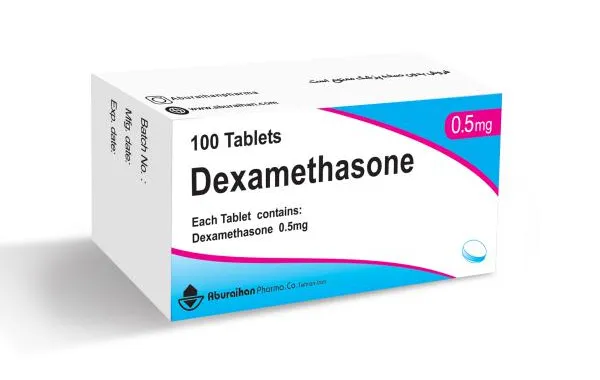Comprehensive Guide to Dexamethasone: Uses, Dosage, Side Effects, and More
What is Dexamethasone?
Overview of Dexamethasone
Generic Name: Dexamethasone
Brand Name: Decadron, DexPak, generics
Drug Group: Corticosteroid (glucocorticoid)
Commonly Used For
- Reduce inflammation and swelling.
- Manage allergic reactions.
- Treat autoimmune conditions.
Key Characteristics
Form: Oral tablets (0.5 mg, 0.75 mg, 1 mg, 1.5 mg, 2 mg, 4 mg, 6 mg), oral solution (0.5 mg/5 mL), injectable (4 mg/mL, 10 mg/mL), ophthalmic drops (0.1%), and topical cream (0.1%) (detailed in Dosage section).
Mechanism: Inhibits phospholipase A2 and reduces cytokine production.
Approval: FDA-approved (1958 for Decadron) and EMA-approved for multiple indications.

Indications and Uses of Dexamethasone
Dexamethasone is indicated for a broad spectrum of inflammatory, autoimmune, and neoplastic conditions, leveraging its potent anti-inflammatory and immunosuppressive effects:
Allergic Reactions: Treats severe allergies, including anaphylaxis and angioedema, reducing swelling and urticaria, often as an adjunct to epinephrine.
Autoimmune Diseases: Manages rheumatoid arthritis, lupus, and multiple sclerosis exacerbations, suppressing immune-mediated inflammation, with tapering regimens.
Inflammatory Conditions: Controls acute inflammation in conditions like gout, bursitis, and tendonitis, alleviating pain and swelling, typically short-term.
Cancer Treatment: Used in chemotherapy (e.g., with lymphoma or leukemia) to reduce nausea, swelling around tumors, and immune responses, enhancing drug efficacy.
Cerebral Edema: Reduces brain swelling due to tumors, trauma, or stroke, improving intracranial pressure, administered in critical care settings.
Asthma Exacerbations: Manages acute asthma attacks, reducing airway inflammation, often with bronchodilators, in emergency or outpatient care.
Off-Label Uses: Includes treatment of chronic obstructive pulmonary disease (COPD) exacerbations to reduce respiratory distress, supported by pulmonology studies; management of COVID-19-related acute respiratory distress syndrome (ARDS) per WHO guidelines, improving survival rates; and use in idiopathic thrombocytopenic purpura (ITP) to boost platelet counts, with hematology evidence.
Adrenal Insufficiency: Replaces cortisol in primary or secondary adrenal insufficiency, stabilizing metabolism, under endocrinologist care.
High-Altitude Cerebral Edema (HACE): Treats HACE in mountaineers, reducing brain swelling, with rapid administration in high-altitude medicine.
Ocular Inflammation: Manages uveitis and allergic conjunctivitis with ophthalmic drops, reducing eye redness and pain, under ophthalmologic supervision.
Neonatal Respiratory Distress Syndrome (RDS): Administered to pregnant women at risk of preterm delivery (24–34 weeks) to enhance fetal lung maturity, per neonatal guidelines.
Dosage of Dexamethasone
Dosage for Adults
Oral (Inflammation/Allergies): 0.75–9 mg daily in divided doses, adjusted based on response, maximum 16 mg/day.
Injectable (Cerebral Edema): Initial: 10 mg IV, followed by 4 mg every 6 hours for 2–4 days, then taper.
Ophthalmic Drops (Ocular Inflammation): 1–2 drops every hour during acute phase, then reduce to 4 times daily, maximum 2 weeks.
Topical Cream (Skin Inflammation): Thin layer applied 1–2 times daily, maximum 14 days.
Dosage for Children
Oral (Inflammation, 1–12 years): 0.02–0.3 mg/kg/day in divided doses, maximum 9 mg/day, under pediatric supervision.
Injectable (Asthma, 1–12 years):
- 0.15–0.6 mg/kg/day IV in divided doses, maximum 16 mg/day, tapered over days.
- Not recommended under 1 year unless critical.
Dosage for Pregnant Women
Pregnancy Category C: Use only if benefits outweigh risks (e.g., fetal lung maturity). Consult an obstetrician, with fetal monitoring.
Dosage Adjustments
Renal Impairment: No adjustment needed; monitor in severe cases (CrCl <30 mL/min).
Hepatic Impairment: Reduce dose by 50% in severe liver disease; monitor closely.
Elderly: Start with 0.5–1 mg daily; increase cautiously to 4–8 mg/day.
Stress Dosing: Increase dose (e.g., double) during surgery or acute illness.
Additional Considerations
- Take this active ingredient with food or milk to minimize gastric irritation.
- Administer injections by a healthcare provider; avoid abrupt cessation.
How to Use Dexamethasone
Administration:
- Oral: Swallow tablets whole with a glass of water or milk, with or after food; avoid grapefruit juice.
- Injectable: Administered by a healthcare provider via IV or IM, typically in hospital settings.
- Ophthalmic Drops: Tilt head back, instill drops, and close eyes for 1–2 minutes; avoid touching dropper tip.
- Topical Cream: Apply a thin layer to affected area, rubbing gently, and wash hands after use.
Timing: Use once or twice daily for oral, as scheduled for injections, maintaining consistency.
Monitoring: Watch for weight gain, mood changes, or signs of infection (e.g., fever).
Additional Tips:
- Store at 20–25°C (68–77°F), protecting from light and moisture.
- Use gloves for topical application; avoid eyes or mucous membranes.
- Report severe headache, vision changes, or signs of adrenal crisis immediately.
Contraindications for Dexamethasone
Hypersensitivity: Patients with a known allergy to Dexamethasone or corticosteroids.
Systemic Fungal Infections: Contraindicated due to immune suppression risk.
Live Virus Vaccines: Avoid during therapy due to reduced immune response.
Ocular Herpes Simplex: Contraindicated with ophthalmic use due to corneal perforation risk.
Warnings & Precautions for Dexamethasone
General Warnings
Adrenal Suppression: Long-term use may cause adrenal insufficiency; taper gradually.
Infections: Masks signs of infection; monitor closely.
Osteoporosis: Increases fracture risk with chronic use; assess bone density.
Hypertension: Elevates blood pressure; check regularly.
Glaucoma: Risk with ophthalmic use; monitor intraocular pressure.
Additional Warnings
Psychiatric Effects: Risk of euphoria, depression, or psychosis; assess mental health.
Peptic Ulcer: May worsen or cause ulcers; use with caution in at-risk patients.
Hyperglycemia: Elevates blood sugar; monitor in diabetics.
Growth Retardation: May slow growth in children; monitor height/weight.
Myopathy: Rare muscle weakness with high doses; discontinue if suspected.
Use in Specific Populations
Pregnancy: Category C; use only if essential with fetal monitoring.
Breastfeeding: Excreted in breast milk; monitor infant for irritability.
Elderly: Higher risk of fractures and hypertension; start with lower doses.
Children: Limited use; supervise closely.
Renal/Hepatic Impairment: Adjust dose; avoid in severe cases.
Additional Precautions
- Inform your doctor about diabetes, infections, or medication history before starting this medication.
- Avoid abrupt cessation; taper over weeks to prevent withdrawal.
Overdose and Management of Dexamethasone
Overdose Symptoms
- Nausea, vomiting, or abdominal distension.
- Severe cases: Acute psychosis, hypertension, or adrenal crisis.
- Insomnia, mood swings, or headache as early signs.
- Seizures with extremely high doses.
Immediate Actions
Contact the Medical Team: Seek immediate medical help.
Supportive Care: Administer IV fluids, monitor vital signs, and provide symptomatic relief (e.g., antacids).
Specific Treatment: Use hydrocortisone for adrenal crisis, manage hypertension with beta-blockers if needed.
Monitor: Check blood glucose, electrolytes, and mental status for 24–48 hours.
Additional Notes
- Overdose risk is low; store securely.
- Report persistent symptoms (e.g., confusion, severe weakness) promptly.
Side Effects of Dexamethasone
Common Side Effects
- Insomnia (10–20%, reduced with evening avoidance)
- Increased Appetite (5–15%, manageable with diet)
- Weight Gain (5–10%, monitored with exercise)
- Mood Changes (3–8%, common with initial use)
- Indigestion (2–6%, relieved with food)
These effects may stabilize with dose adjustment.
Serious Side Effects
Seek immediate medical attention for:
- Endocrine: Adrenal suppression, Cushing’s syndrome, or diabetes.
- Gastrointestinal: Peptic ulcer, perforation, or pancreatitis.
- Cardiovascular: Hypertension, heart failure, or thromboembolism.
- Ocular: Glaucoma or cataracts.
- Allergic: Rash, angioedema, or anaphylaxis.
Additional Notes
- Regular monitoring for bone density, blood sugar, and infection risk is advised.
- Report any unusual symptoms (e.g., vision loss, severe fatigue) immediately to a healthcare provider.
Drug Interactions with Dexamethasone
This active ingredient may interact with:
- NSAIDs: Increases GI bleeding risk; monitor closely.
- Antidiabetic Agents: Reduces efficacy; adjust dose.
- Warfarin: Enhances anticoagulant effect; monitor INR.
- Live Vaccines: Reduces immune response; avoid.
- Phenytoin: Decreases Dexamethasone levels; adjust dose.
Action: Provide your healthcare provider with a complete list of medications.
Patient Education or Lifestyle
Medication Adherence: Take this corticosteroid as prescribed to manage inflammation, following the exact schedule.
Monitoring: Report weight gain, mood swings, or signs of infection immediately.
Lifestyle: Avoid alcohol; maintain a balanced diet rich in calcium.
Diet: Take with food to reduce stomach upset; avoid grapefruit.
Emergency Awareness: Know signs of adrenal crisis or infection; seek care if present.
Follow-Up: Schedule regular check-ups every 3–6 months to monitor bone and glucose levels.
Pharmacokinetics of Dexamethasone
Absorption: Well-absorbed orally (peak at 1–2 hours); IV onset immediate.
Distribution: Volume of distribution ~0.7 L/kg; 77% protein-bound.
Metabolism: Hepatic via CYP3A4 to inactive metabolites.
Excretion: Primarily renal (60%) as free drug; half-life 4–5 hours.
Half-Life: 4–5 hours, with prolonged anti-inflammatory effects.
Pharmacodynamics of Dexamethasone
This drug exerts its effects by:
Inhibiting inflammatory mediators (e.g., prostaglandins, leukotrienes).
Suppressing immune responses via T-cell and cytokine modulation.
Reducing edema in cerebral and neoplastic conditions.
Demonstrating dose-dependent metabolic and immunosuppressive risks.
Storage of Dexamethasone
- Temperature: Store at 20–25°C (68–77°F); protect from light and moisture.
- Protection: Keep in original container, away from heat.
- Safety: Store out of reach of children.
- Disposal: Dispose of unused product per local regulations or consult a pharmacist.
Frequently Asked Questions (FAQs)
Q: What does Dexamethasone treat?
A: This medication treats inflammation and allergies.
Q: Can this active ingredient cause weight gain?
A: Yes, weight gain may occur; monitor diet.
Q: Is Dexamethasone safe for children?
A: Yes, for 1+ years with a doctor’s guidance.
Q: How is this drug taken?
A: Orally, by injection, or topically, as directed.
Q: How long is Dexamethasone treatment?
A: Short- or long-term, with tapering.
Q: Can I use Dexamethasone if pregnant?
A: Yes, with caution; consult a doctor.
Regulatory Information for Dexamethasone
This medication is approved by:
U.S. Food and Drug Administration (FDA): Approved in 1958 (Decadron) for multiple indications.
European Medicines Agency (EMA): Approved for inflammation and autoimmune conditions.
Other Agencies: Approved globally for various uses; consult local guidelines.
References
- U.S. Food and Drug Administration (FDA). (2023). Decadron (Dexamethasone) Prescribing Information.
- Official FDA documentation detailing the drug’s approved uses, dosage, and safety.
- European Medicines Agency (EMA). (2023). Dexamethasone Summary of Product Characteristics.
- EMA’s comprehensive information on the medication’s indications and precautions in Europe.
- National Institutes of Health (NIH). (2023). Dexamethasone: MedlinePlus Drug Information.
- NIH resource providing detailed information on the drug’s uses, side effects, and precautions.
- World Health Organization (WHO). (2023). WHO Model List of Essential Medicines: Dexamethasone.
- WHO’s inclusion of Dexamethasone for inflammation and emergencies.
- New England Journal of Medicine. (2022). Dexamethasone in COVID-19 ARDS.
- Peer-reviewed article on Dexamethasone efficacy (note: access may require a subscription).
